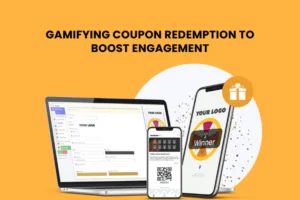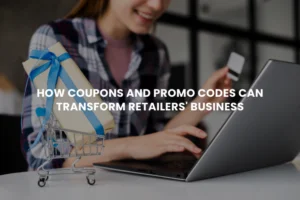If you’re a retailer and believe that having a website is sufficient enough to stand out in the marketplace, then you’re mistaken. Digital experiences have changed the way we shop today. Contactless deliveries and shopping trends have triggered the adoption of retail apps as people spending time on mobile apps has increased by 20%.
Mobile applications are progressively getting popular among users as they provide an extraordinary customer experience, better security, and easy accessibility over other solutions like websites.
But why use mobile apps? Two crucial reasons – a) Consumers spend more than 3 hours on their smartphones daily. b) 79% of consumers browse products on their phones. While we can point towards many numbers and statistics that state how consumers want everything on their mobile phones, it is a fact that traditional retail methods have been experiencing low sales due to the surge in eCommerce that has helped online retailers grow so well.
This makes it more crucial than ever for retailers to leverage the benefits of this new application experience as mobile apps can offer a lot more than a platform to browse products easily.
Mobile Apps can be Used 24×7
While traditional brick-and-mortar stores have fixed store timings, mobile apps are not restricted to operating within working hours. Even an order placed at midnight through a mobile app can go a long way to boost your revenue. People are engrossed in today’s bustling lives, and most customers don’t have the time to visit the store during working hours. A mobile app can solve this issue as consumers can shop when commuting to their office, during lunch breaks, or sit at night peacefully and order their favorite things from their preferred store: more sales, the better the growth.
Improve Customer Satisfaction
Earlier, retailers would use traditional phone calls, emails, in-store returns, etc., to solve customer complaints and grievances. Consumers have to go through long wait times that are pretty annoying. Though the advent of live chat has helped address this issue (to some extent), a mobile app is much more efficient.
Mobile apps help you interact with your customer easily, enabling you to collect data and understand their preferences more quickly. Studies show that artificial intelligence and machine learning can assist retailers in predicting which issues their customers are most likely to encounter, cutting down on long-winded methods, serving customers better, and improving customer satisfaction.
Push Notifications Increase Customer Engagement
Retailers can send push notifications through mobile apps. They are very beneficial to instantly tell customers about new product launches, offers, discounts, etc. You can even send personalized notifications according to customers’ interests and shopping behavior. Push notification is a powerful way to engage customers as it accounts for 90% open rates. By providing constant details about products or the brand, retailers can increase customer engagement and conversions. Apart from product information, push notifications can be used to send order status details, reminders, and payment receipts. Customers don’t have to log in to their emails and check for necessary information about their orders. A push notification is just enough!
Mobile Apps Help Retailers Manage Inventory and Bulk Orders more Efficiently
Naturally, given the state of uncertainty and social distancing, it is pretty challenging for retailers to draw in consumers and keep in-store interactions to a minimum. At the same time, it is an exciting opportunity for them to use mobile apps to manage inventory like never before. Apps can provide details about the availability of products much easier, enabling customers to make bulk orders and request products that are not available.
Retailers can better estimate product volumes and manage labour accordingly. This helps to avoid long queues and congestion at the counters.
Retail Loyalty Programs through Mobile Apps
Loyalty programs are a great way to retain customers, and it’s a bonus when offered through mobile apps. Offering exciting rewards can urge customers to shop through the app and increase sales. More time spent on mobile apps can increase the base of loyal customers. OptCulture’s loyalty program solutions offer easy integration and help retailers track ROI quickly.
Conclusion
Consumers spend more time on apps than websites because they are faster, more accessible, smoother, and provide a far better user experience. Indeed, mobile apps will be a dedicated ingredient for retailers moving forward.
This blog was originally written by Priya Dialani for OptCulture.
Mobile applications are progressively getting popular among users as they provide an extraordinary customer experience, better security, and easy accessibility over other solutions like websites.
But why use mobile apps? Two crucial reasons – a) Consumers spend more than 3 hours on their smartphones daily. b) 79% of consumers browse products on their phones. While we can point towards many numbers and statistics that state how consumers want everything on their mobile phones, it is a fact that traditional retail methods have been experiencing low sales due to the surge in eCommerce that has helped online retailers grow so well.
This makes it more crucial than ever for retailers to leverage the benefits of this new application experience as mobile apps can offer a lot more than a platform to browse products easily.
Mobile Apps can be Used 24×7
While traditional brick-and-mortar stores have fixed store timings, mobile apps are not restricted to operating within working hours. Even an order placed at midnight through a mobile app can go a long way to boost your revenue. People are engrossed in today’s bustling lives, and most customers don’t have the time to visit the store during working hours. A mobile app can solve this issue as consumers can shop when commuting to their office, during lunch breaks, or sit at night peacefully and order their favorite things from their preferred store: more sales, the better the growth.
Improve Customer Satisfaction
Earlier, retailers would use traditional phone calls, emails, in-store returns, etc., to solve customer complaints and grievances. Consumers have to go through long wait times that are pretty annoying. Though the advent of live chat has helped address this issue (to some extent), a mobile app is much more efficient.
Mobile apps help you interact with your customer easily, enabling you to collect data and understand their preferences more quickly. Studies show that artificial intelligence and machine learning can assist retailers in predicting which issues their customers are most likely to encounter, cutting down on long-winded methods, serving customers better, and improving customer satisfaction.
Push Notifications Increase Customer Engagement
Retailers can send push notifications through mobile apps. They are very beneficial to instantly tell customers about new product launches, offers, discounts, etc. You can even send personalized notifications according to customers’ interests and shopping behavior. Push notification is a powerful way to engage customers as it accounts for 90% open rates. By providing constant details about products or the brand, retailers can increase customer engagement and conversions. Apart from product information, push notifications can be used to send order status details, reminders, and payment receipts. Customers don’t have to log in to their emails and check for necessary information about their orders. A push notification is just enough!
Mobile Apps Help Retailers Manage Inventory and Bulk Orders more Efficiently
Naturally, given the state of uncertainty and social distancing, it is pretty challenging for retailers to draw in consumers and keep in-store interactions to a minimum. At the same time, it is an exciting opportunity for them to use mobile apps to manage inventory like never before. Apps can provide details about the availability of products much easier, enabling customers to make bulk orders and request products that are not available.
Retailers can better estimate product volumes and manage labour accordingly. This helps to avoid long queues and congestion at the counters.
Retail Loyalty Programs through Mobile Apps
Loyalty programs are a great way to retain customers, and it’s a bonus when offered through mobile apps. Offering exciting rewards can urge customers to shop through the app and increase sales. More time spent on mobile apps can increase the base of loyal customers. OptCulture’s loyalty program solutions offer easy integration and help retailers track ROI quickly.
Conclusion
Consumers spend more time on apps than websites because they are faster, more accessible, smoother, and provide a far better user experience. Indeed, mobile apps will be a dedicated ingredient for retailers moving forward.
This blog was originally written by Priya Dialani for OptCulture.
Latest Posts
How to Create a Successful Gift Card Rewards Program for Customer Retention
October 17, 2024
How to Create a Successful Gift Card Rewards Program for...
The Importance of Loyalty Benefits: How Discounts and Promo Codes Drive Customer Retention
October 16, 2024
The Importance of Loyalty Benefits: How Discounts and Promo Codes...
Gamifying Coupon Redemption to Boost Engagement
October 16, 2024
Gamifying Coupon Redemption to Boost Engagement In today's crowded...
Reducing Customer Churn with Retargeting Promo Codes
October 16, 2024
Reducing Customer Churn with Retargeting Promo Codes In retail,...
How Coupons and Promo Codes Can Transform Retailers’ Business
October 16, 2024
How Coupons and Promo Codes Can Transform Retailers' Business ...




